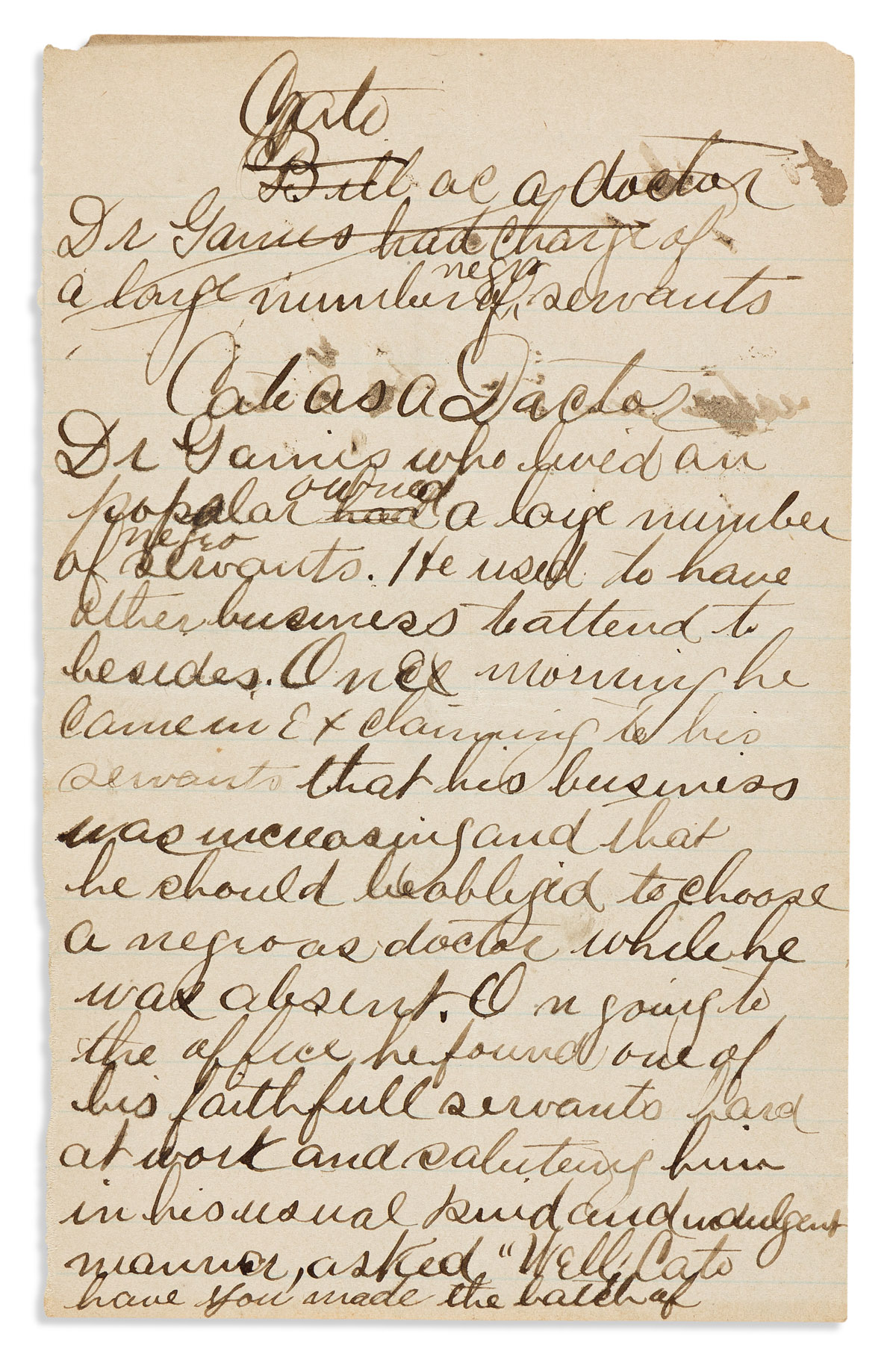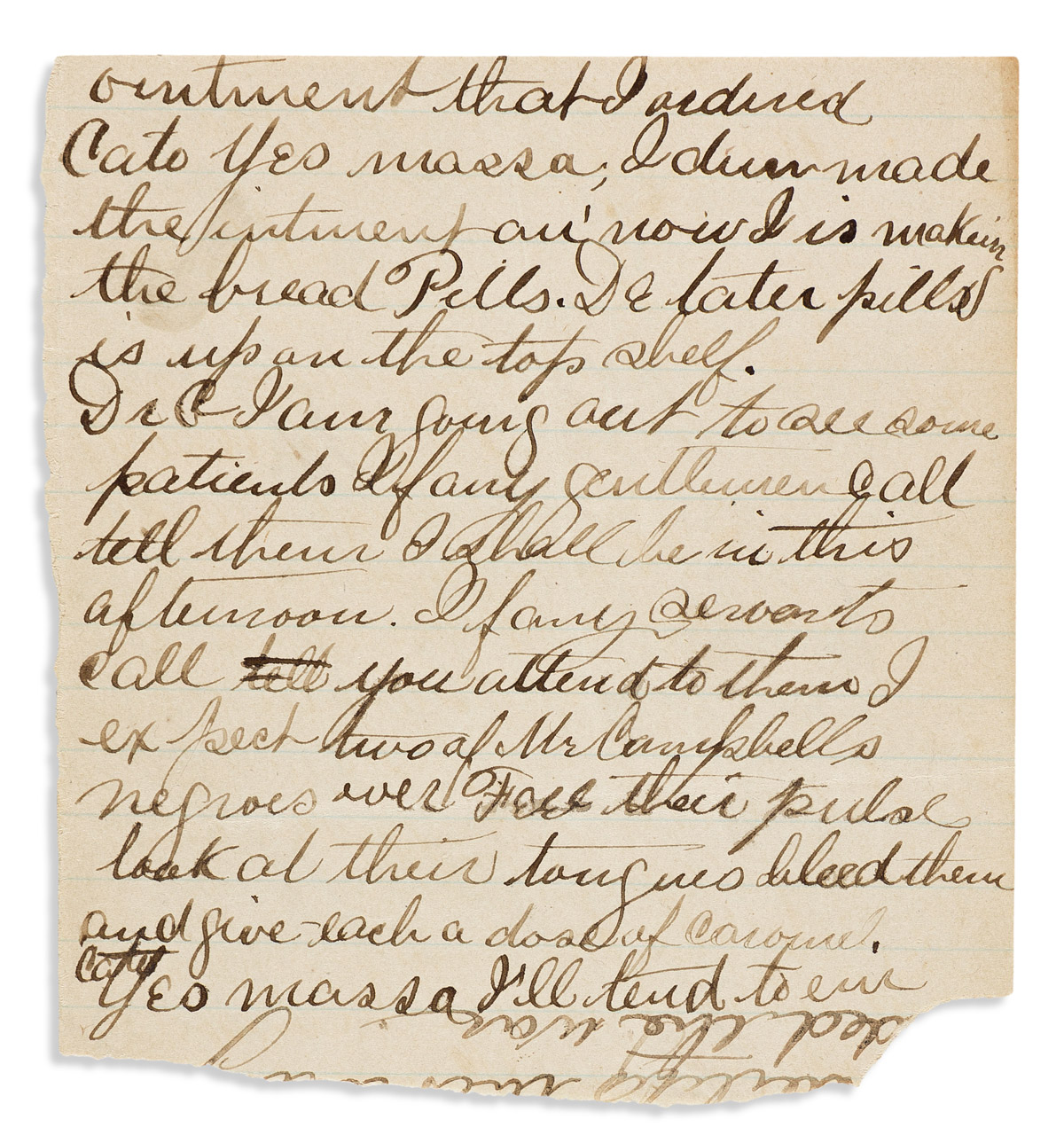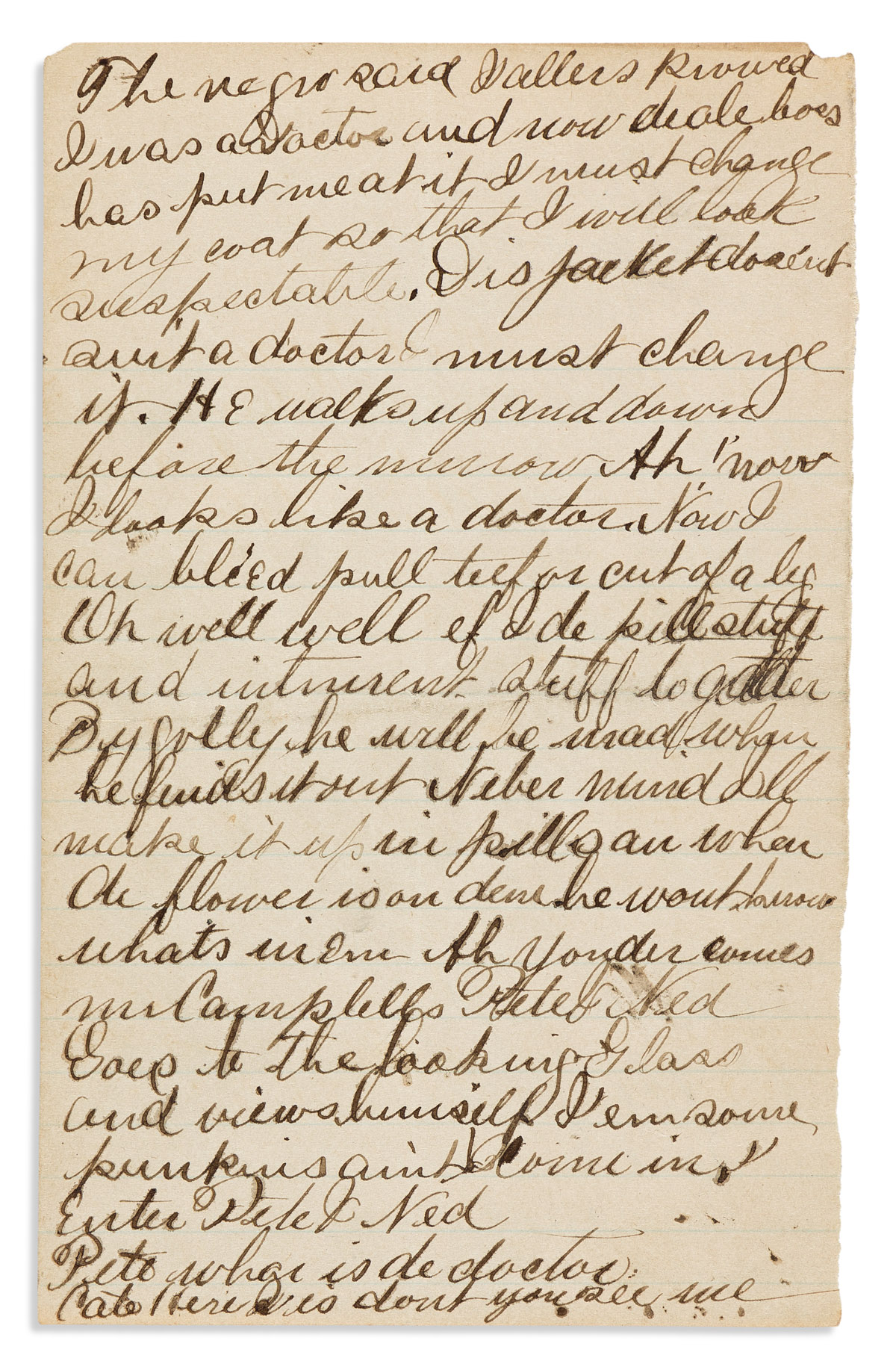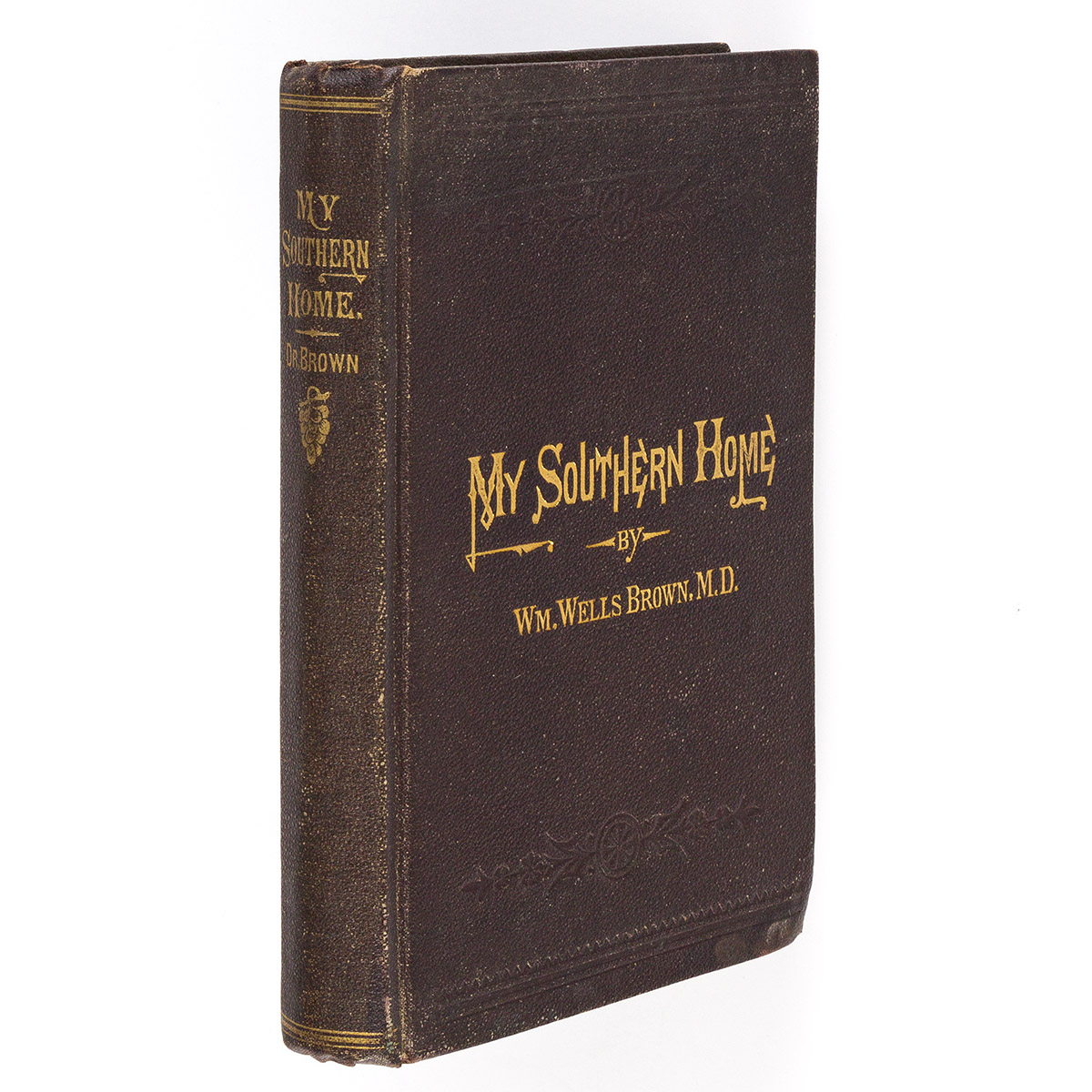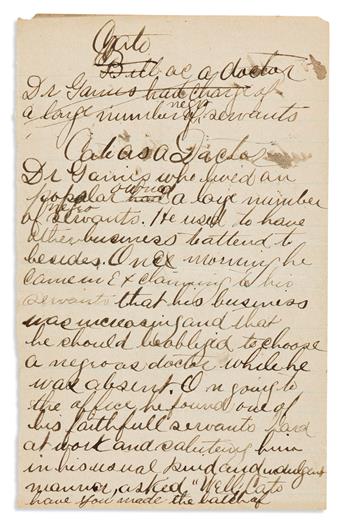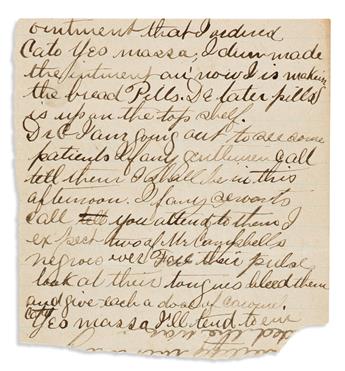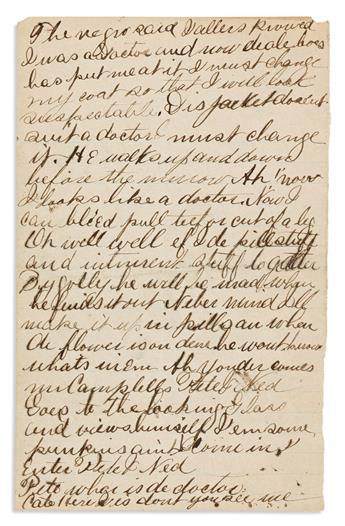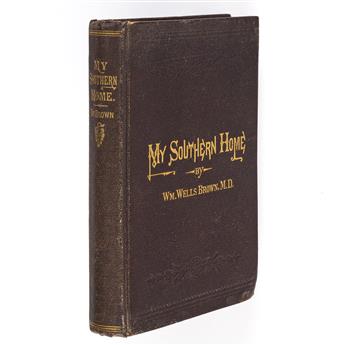Sale 2598 - Lot 297
Price Realized: $ 5,200
Price Realized: $ 6,500
?Final Price Realized includes Buyer’s Premium added to Hammer Price
Estimate: $ 10,000 - $ 15,000
(LITERATURE.) William Wells Brown. Manuscript draft of a passage from his My Southern Home. 4 manuscript pages on 2 leaves, 7x 4 1/4 inches and a 4 3/4 x 4 1/2-inch fragment; both apparently torn from a notebook, with ink blots and corrections but otherwise no apparent wear. No place, circa late 1870s
Additional Details
Born into slavery in Kentucky, William Wells Brown (circa 1814-1884) escaped at the age of 19 and became a prominent author and abolitionist. His Clotel is regarded as the first novel by an African American. In his later years in Boston, his second wife Annie Elizabeth Gray Brown (1835-1902) managed the family publishing company, while Brown practiced homeopathic medicine. His final book, My Southern Home, was a fictionalized memoir.
The present manuscript is a rough draft of one comic passage in the book, in which the master Dr. Gaines deputizes his slave Cato to serve as physician in his absence. Cato attempts to pull the tooth of another enslaved man, but pulls the wrong one. Brown had published at least three variants of this "Negro Dentist" story before, but this manuscript contains elements unique to the version in My Southern Home, pages 30-31. On the verso of the second page are a few completely unrelated lines on the Napoleonic Wars in the same hand.
The manuscript is discussed at length in Ezra Greenspan's recent biography of Brown (see below): "The scene of Sam as the Black Doctor is the nearly unique instance in which a manuscript documenting Brown's compositional practice survives . . . written in an unidentified hand (perhaps Annie's). The manuscript is undated, but it was very likely written in the late 1870s as a trial draft for a scene in chapter 3 of My Southern Home. Although the entire scene derives from Act 1, Scene 2, of The Escape, it introduces new details and language that exactly match the text of My Southern Home, as when Dr. Gaines is described sarcastically as 'saluting [Cato] in his usual kind and indulgent manner' before tasking him" (page 497). Greenspan saw the manuscript in the private collection of the consignor, who is named in the footnotes on page 573. The first page is reproduced in Greenspan's book in a plate facing page 281.
WITH--William Wells Brown. "My Southern Home: or, The South and Its People." Frontispiece portrait. vii, [1], 253, [3] pages including a leaf of advertisements for other books by the author. 8vo, publisher's gilt cloth, minor wear; minimal dampstaining, generally clean and fresh with no ownership markings. This is not only the first edition of the work in question--it is the copy in which the manuscript was found. The start of the relevant passage on page 29 bears a faint pencil check mark, suggesting that the original owner had compared the manuscript with the printed text. Boston: A.G. Brown & Co. (Brown's wife), 1880.
AND--Ezra Greenspan's "William Wells Brown: An African American Life," which discusses the manuscript and reproduces a page from it. New York, [2014].
The present manuscript is a rough draft of one comic passage in the book, in which the master Dr. Gaines deputizes his slave Cato to serve as physician in his absence. Cato attempts to pull the tooth of another enslaved man, but pulls the wrong one. Brown had published at least three variants of this "Negro Dentist" story before, but this manuscript contains elements unique to the version in My Southern Home, pages 30-31. On the verso of the second page are a few completely unrelated lines on the Napoleonic Wars in the same hand.
The manuscript is discussed at length in Ezra Greenspan's recent biography of Brown (see below): "The scene of Sam as the Black Doctor is the nearly unique instance in which a manuscript documenting Brown's compositional practice survives . . . written in an unidentified hand (perhaps Annie's). The manuscript is undated, but it was very likely written in the late 1870s as a trial draft for a scene in chapter 3 of My Southern Home. Although the entire scene derives from Act 1, Scene 2, of The Escape, it introduces new details and language that exactly match the text of My Southern Home, as when Dr. Gaines is described sarcastically as 'saluting [Cato] in his usual kind and indulgent manner' before tasking him" (page 497). Greenspan saw the manuscript in the private collection of the consignor, who is named in the footnotes on page 573. The first page is reproduced in Greenspan's book in a plate facing page 281.
WITH--William Wells Brown. "My Southern Home: or, The South and Its People." Frontispiece portrait. vii, [1], 253, [3] pages including a leaf of advertisements for other books by the author. 8vo, publisher's gilt cloth, minor wear; minimal dampstaining, generally clean and fresh with no ownership markings. This is not only the first edition of the work in question--it is the copy in which the manuscript was found. The start of the relevant passage on page 29 bears a faint pencil check mark, suggesting that the original owner had compared the manuscript with the printed text. Boston: A.G. Brown & Co. (Brown's wife), 1880.
AND--Ezra Greenspan's "William Wells Brown: An African American Life," which discusses the manuscript and reproduces a page from it. New York, [2014].
Exhibition Hours
Exhibition Hours
Aliquam vulputate ornare congue. Vestibulum maximus, libero in placerat faucibus, risus nisl molestie massa, ut maximus metus lectus vel lorem.



